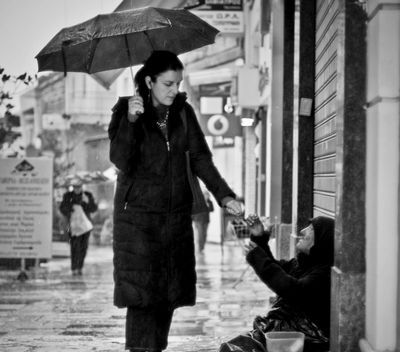哲理美文:乞丐启示录
|
爱思英语编者按:在越南胡志明市里我们旅馆外面,有一个颇似古代人的老妇人倚着拐杖,伸手在门口等着。每天,当我和她目光交汇时,我都会把我的手放在她的手里。她也会对我的微笑、握手及问候报以同样的微笑、握手及问候。 How I’ve Been Enriched by Beggars 乞丐启示录 Everyone has a kind inside. If you want to talk to him, the king will appear. Outside our hotel in Ho Chi Minh City, Vietnam, a seemingly ancient woman on crutches waited beside the door with her hand outstretched. Every day I put my hand in hers as our eyes met. She never failed to return my smile, my grasp, and my greeting. On the last day of our visit, I found myself alone on a busy corner across the street from our hotel. Bicycles and motorbikes careened in front of me. We had been advised to walk straight through the teeming traffic without looking right or left. Let them avoid us. But tonight I was by myself and felt inadequate to face the torrent of vehicles. As I hesitated on the curb, I felt a hand on my elbow and looked down to see the smile of my small beggar friend looking up at me. She nodded her head toward the street, indicating that she would take me across. Together, we moved slowly into the chaos as she gently prodded me forward.
When we reached the center of the crossing, I looked down at her again, and couldn’t resist exclaiming, “You have the most beautiful smile.” She obviously knew little English, but must have recognized the tone, for she threw both arms and crutches around me in a big hug, while the traffic streamed by us on both sides. Then we precarious moved on toward the sidewalk, where she pulled my face down to hers, kissed me on both cheeks, and then limped away, still smiling and waving back to me. I had not given her a single coin. We had shared something vastly more important - a warming of hearts in friendship. This experience remained me of something Mother Teresa once said: “If you cannot do great things, you can do small things with great love.” To look beggars in the eye and smile, thus acknowledging their existence, is a small thing. Putting your hand into another’s outstretched hand and grasping it firmly for a moment is also a small thing. Learning to use a greeting in the local language is not too difficult. But these are important. Traveling in poorer nations, I have witnessed a variety of ways to deal with beggars. The most common response of tourists faced with the poverty-stricken is to ignore them and focus their eyes elsewhere. I have seen people push away an outstretched hand in angry annoyance. A few may hastily drop a few coins into a beseeching palm, and then execute a quick getaway in hopes that another 20 ragged pursuers won’t immediately appear on the scene. But I feel it’s worthwhile to try to live by the words of English author John Cowper Powys: “No one can consider himself wholly civilized who does not look upon every individual, without a single exception, as of deep and startling interest.” I once spotted a legless man sitting by a road at the Pushkar Camel Fair in India. I was returning to my tent after recording the exotic music of the dancing men of Pushkar and was replaying the music on my tape recorder. When the man’s smile lured me to join him, we began to communicate in the kind of sign language and laughter one learns while vagabonding around the world. After mimicking the whirling skirts and sticks, I showed him how my tape recorder worked. He motioned for me to give it to him. I hesitated, but only for a moment. After examining it carefully, he began to sing a hauntingly beautiful song, indicating that he wanted me to record it and take it home as a memory of our time together. Moments before, we had been total strangers: suddenly, we were cemented in a momentary friendship born of our common existence in this world. His eyes shone as we exchanged names. My experience with Vidur confirmed the truth of the Scandinavian proverb: “In every man there is a king. Speak to the king, and the king will come forth.” I’ve learned that those considered the world’s most hopeless are so often rich in humanity, with hearts yearning to be affirmed - and ready to respond. My life continues to be enriched by connecting with everyday humanity. Each time I do this, I rediscover that what I have been given is far beyond monetary value. And I reaffirm that everyone is worthy - and worth knowing. |









